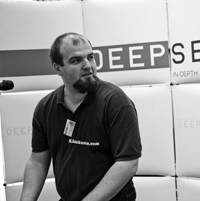DeepSec2018 Talk: Manipulating Human Memory for Fun and Profit – Stefan Schumacher
Manipulating the Human Memory for Fun and Profit, or: Why you’ve never met Bugs Bunny in DisneyLand
Hacking is not limited to technical things — like using a coffee machine to cook a soup — but also makes use of social engineering. Social engineering is the (mis)use of human behaviour like fixed action patterns, reciprocity or commitment and consistency. Simple social engineering attacks like phishing mails do not require much preparation, but more complex ones do so. Especially when one wants to set up some kind of advanced persistent threat in the psychological domain. So, besides the psychological fundamentals of social engineering we also did research on human memory, how it works, how it pretty much fails to store what really happened, and how it can be misused for a sinister purpose. The fundamental research for this topic comes from forensic psychology, were court-appointed psychologists have to examine the credibility of witness reports and ranges to experiments were manipulated photos changed the memory of subjects. This talk will summarise the current state of the research and show ways to conduct very advanced social engineering attacks and how we can recognise and counter them. As technical hacking gets more and more complex and advanced over time, the psychological domain of IT security will also advance.

Stefan Schumacher is the president of the Magdeburg Institute for Security Research and editor of the Magdeburg Journal for Security Research in Magdeburg/Germany. He started his hacking career before the fall of the Berlin Wall, on a small East German computer with 1.75 MHz and a Datasette drive.
Ever since, he liked to explore technical and social systems, with a focus on security and how to exploit them. He was a NetBSD developer for some years and involved in several other Open Source projects and events. He studied Educational Science and Psychology, has done a lot of unique research about the Psychology of Security with a focus on Social Engineering, User Training and Didactics of Security/Cryptography. Currently he’s leading the research project Psychology of Security,focusing on fundamental qualitative and quantitative research about the perception and construction of security.
He presents the results of his research regularly at international conferences like AusCert Australia, Chaos Communication Congress, Chaos Communciation Camp, DeepSec, DeepIntel, Positive Hack Days Moscow or LinuxDays Luxembourg and in security related journals and books.
